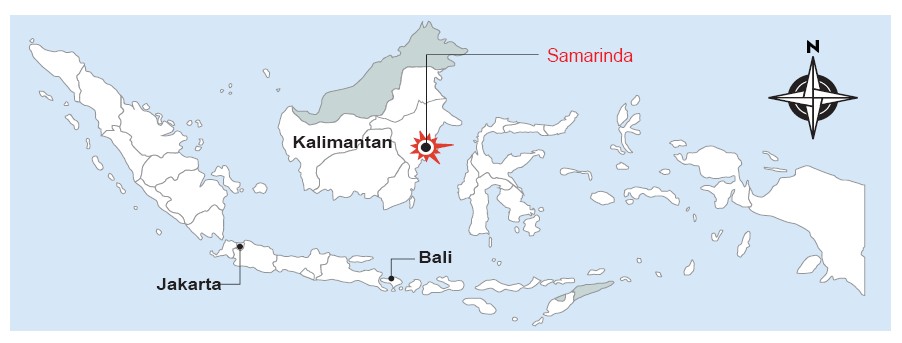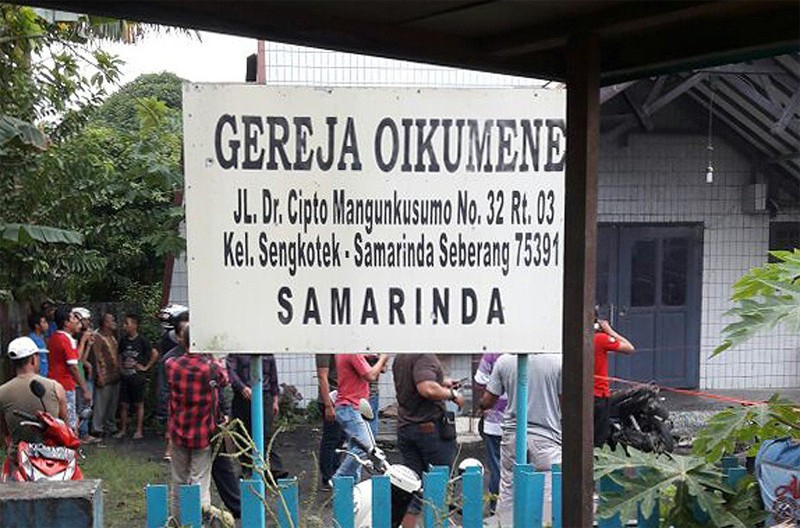Popular Reads
Top Results
Can't find what you're looking for?
View all search resultsPopular Reads
Top Results
Can't find what you're looking for?
View all search resultsKalimantan church bomber linked to IS movement
Change text size
Gift Premium Articles
to Anyone
A
church in Samarinda, East Kalimantan, suffered minor damages and four infants were injured after a handmade bomb, reportedly a molotov cocktail, thrown by a former convicted terrorist linked to the Islamic State (IS) group, exploded on Sunday.
The incident has put the nation’s security under greater scrutiny as the attack occurred during a period in which the nation’s stability still hangs in the balance due to recent religious tension in Jakarta.
It was the second time this year a convicted terrorist launched attacks, raising concerns over the country’s “lenient” terrorism regulations and remissions system that reduced the convict’s prison term.
The Samarinda attacker and former convicted terrorist, identified as Johanda, alias Jo Bin Muhammad Aceng Kurnia, carried out the attack at 10:15 a.m. on Sunday as members of the congregation of Oikumene church were about to conclude their prayers.
Four toddlers aged two to three years playing at the church compound were injured and rushed to a nearby hospital for immediate treatment.
President Joko “Jokowi” Widodo said he had ordered National Police chief Gen. Tito Karnavian to fully investigate the attack and bring the perpetrator to justice.
“I have made the instruction to the National Police chief to handle the law enforcement firmly and investigate the perpetrator thoroughly,” Jokowi said on Sunday.
The West Jakarta District Court sentenced Johanda to three years and six months in May 2011 for his involvement in a plot to blow up the Center for Science and Technology Research (Puspiptek) complex in Serpong, Banten, the site of a nuclear reactor, and Christ Cathedral Church in Gading Serpong, also in Banten.
 (-/-)
(-/-)
“Johanda was released on parole after receiving sentence cuts during the celebration of Idul Fitri festivities on July 28, 2014. He has been arrested and detained at the Samarinda Police office,” National Police spokesman Insp. Gen. Boy Rafly told The Jakarta Post on Sunday.
Previously, the offender in the notorious Thamrin terror attack on Jan. 14 in Jakarta, Sunakim, was supposed to have remained in prison until 2017 on terrorism charges, but the Law and Human Rights Ministry shortened his sentence by two years, which allowed him to receive parole in August 2015, five months before he attacked police officers and killed four civilians in January 2016.
Johanda was also released in July 2014 after receiving four months’ remission from the Ministry for showing “good behavior” while serving time in prison.
Samarinda’s attack has also raised concerns over the ministry’s deradicalization program for terrorism prisoners at penitentiaries across the country because as soon as Johanda was freed, he directly joined an East Kalimantan branch of the Jamaah Ansharut Daulah (JAD) — a terrorist faction in the country that supports IS.
The recidivists also reportedly had links to Anshori groups in East Java, a province currently under the supervision of the National Police due to indications that the radical group would purchase firearms from the Philippines.
Spokesman from the Law and Human Rights Ministry’s Directorate General of Penitentiaries, Akbar Hadi, said there was no guarantee that convicted terrorists who had been released from prison would not repeat the same offence and, thus, it was important for members of society to welcome them after their respective releases so that the convicts would not feel alienated.
Akbar said all terror convicts released from prison should have been under the supervision of the National Counterterrorism Agency (BNPT) and the National Police.
“It could be that he becomes radicalized again after returning to society,” Akbar told the Post.
“This is subject to post release monitoring — problems that must be solved by the ministry and the BNPT,” terrorism expert from the University of Indonesia Ridwan Habib said, adding that deradicalization programs launched by the BNPT and the ministry in prisons were ineffective.
“This kind of attack repeats itself in the same way. We have seen the Thamrin attack, which was carried out by a recidivist, and if we look back we will find many cases like this,” Ridwan said.










